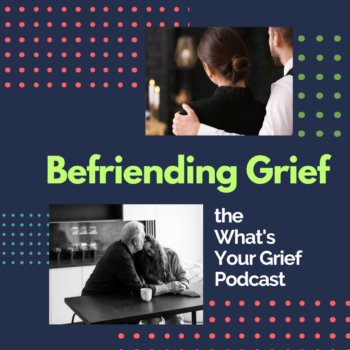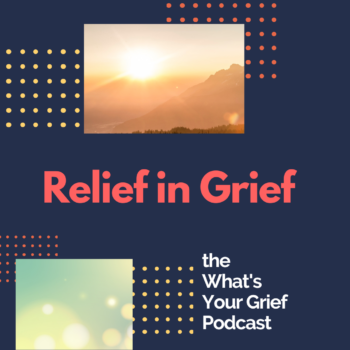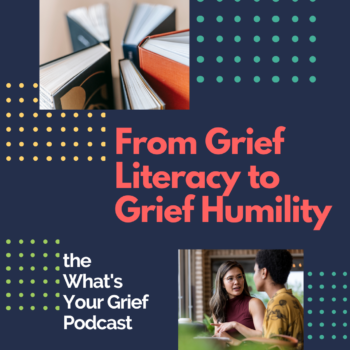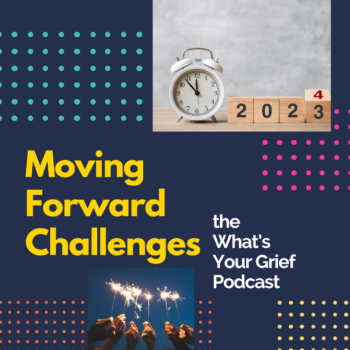Ask Me Anything (about Grief)
/ What's Your Grief Podcast : Litsa Williams
The What's Your Grief Podcast: grief support for those who like to listen.

In this grief podcast, Eleanor Haley, MS and Litsa Williams, MA, LCSW-C, the mental health professionals behind the website and book 'What's Your Grief', leave no stone unturned in demystifying the complicated and messy world of living life after loss. One digestible topic at a time, Haley and Williams distill topics ranging from grief theory to coping. Grief is sad and confusing, but your grief support doesn't have to be. You can listen here by using the player above or listen and subscribe wherever you get your podcasts.
Below we have provided a transcript of the episode.
Hey and welcome to this episode of the What's Your Grief Podcast. This is Litsa and I am not joined by Eleanor today.
You may have noticed that we are a few weeks behind on the podcast. Apologies. We have had some trouble connecting schedule-wise. Not (not) like as humans. Eleanor and I are still connected as humans, we just have had a difficult time connecting schedule-wise in order to record. And so I wanted to get a episode up before the end of the month. So I am here solo today. And what I decided to do was a little Q&A and I did that by posting and asking anything an AMA on our Instagram stories yesterday and just left it wide open for any questions that people might have about their grief, about us, about anything that they might want to ask. So I had some questions come in and I'm just gonna go through and get through as many as I can. We'll (we'll) see how it goes. We'll see how many I make it through. But there was some good ones on here so obviously we're not gonna go super in depth on each of them but I wanted to spend a little time on them and see where we get.
So the first question that I wanted to answer was How to support someone who hasn't fully acknowledged their loss #avoidance is how they submitted this question.
I think this is a really great question and it gets to the root of something that I think is really hard for us which is that we often really struggle to see another person suffering in some way. And that means that our instinct is that we want to help them, we want to support them. And we often want to do that in the way and time that works for us. And one of the things that we know with grief is that there is no timeline. That it looks different for everyone. And, you know, avoidance, it's interesting, this idea of somebody who hasn't fully acknowledged the loss. I don't know the details of the circumstances here so there are ways that obviously that might be really explicit. But I think oftentimes there are ways that sometimes we think that people are not acknowledging the loss or they're avoiding because we're not seeing their grief come out in the way that we expect it to. We know that some people, as we've talked about before, we have an old episode about this you can listen to, there are different grief styles that people have in, different styles of coping and some people lean on this more intuitive end of the spectrum. And that's what we expect. We see them maybe talking about their loss, being emotional, expressing some of their inward feelings externally and (and) connecting with others about it. But then we know there are other people who lean more instrumental. And people who are more instrumental are not as inclined to show externally the things that they're feeling internally. Oftentimes, they process their grief more cognitively so it's sometimes more about thoughts rather than feelings. They feel it more physically. Sometimes they want to be more active and so in that action or activity or physical stuff that they're doing, some people interpret that as avoidance or interpret them as not really acknowledging the loss or dealing with their grief. Now there are people who are really avoiding and who really haven't acknowledged the loss. That's I, I don't want to dismiss that completely. But I do think the first step of what's really important here is to check our own assumptions about whether this person is really not acknowledging their grief and is really avoiding, or whether it may be that their grief and the way that they're processing their loss doesn't look the way that we expected it to and it doesn't look maybe like our grief would. So to start from that place, I think is always the most helpful thing for or anyone else who is grieving. If this is something where you feel like they really truly are avoiding and they really really haven't acknowledged the loss, I think one thing to also then remember is that we can't control anyone else's grief process. We have to let people know that we are there for them, that we're open for them that we understand that maybe this is something that they're going to be processing overtime, that it's very common that grief doesn't necessarily hit people most intensely in those days or weeks or even the first couple of months after a loss, that it's not uncommon for it to hit a little bit further out when that initial shock wears off or when people have stopped having to take care of all the things in the beginning with arrangements and funerals and all of those things and when life sort of starts to set back in again. So I think letting someone know that you're there for them is often the best thing that we can do for another person while also not trying to push them or trying to suggest that we know the timeline for them better than they do, but encouraging them to listen to themselves and let them know that you're there for them and whatever they need.
There were a number of questions we got that was tied, we're tied to supporting another person. So I'm trying to kind of lump some of those questions together. And one of them was very specific to What is the best way to support a partner? And in this case, specifically a partner who has just lost their second parent.
This is a tough question because you'll see all over Instagram, you know, these tips of like here's how to support someone grieving, do this don't do that, say this don't say that. And one of the things that is hard is it is so specific to each individual person and what they're grieving, how they're grieving, their grief style, their personality, your relationship with them. There's so many factors that creating those checklists, I think can be really really risky, because there are very few universals. We've done surveys about this with our community and had thousands of responses and the thing that was so fascinating is that sometimes what half essentially a broke down surprisingly equally, that some of the things that people most disliked other people really liked and vice versa. So one of the things that's important, I think, is to start by just knowing your partner and what has been helpful for them in the past when they've gone through things that are difficult. And some of that might come through you being able to reflect back on what you've done to help them in difficult times that may not have been something like the death of a parent or a loved one but that might have just been other difficult times. What do, what do they need? How did they take care of themselves? How do they seem to like to receive support from you or for from other people? Sometimes it can be conversations about that. One of the things that can frustrate grievers is sometimes that question of, you know, what do you need or what can I do, because people don't always feel sure what the answer to that is. But sometimes they are able to identify, you know, when you went through in this case, when you went through the death of your first parent, what helped you then, what got you through, was there anything that people around you did that really felt supportive, and is there anything that really wasn't helpful. Because it can be as important to know what to steer clear of, as it can be to know what to do. One thing that I think for many people, though not everyone, will be helpful, is that idea of knowing that you want to be part of keeping their connection to their parents as part of your connection and as part of your, you know, the family that you have together. So I think, oftentimes, when we lose someone our deepest fear is that all of those memories, all of those connections, slowly with time are going to fade further and further away and that we're going to get more and more distant. And oftentimes, if we can feel a lot of support that the people around us want us to be able to keep those connections, that you want to hear as many stories as they want to tell, that you want to be able to keep traditions that were important to this person, you know, as part of maybe traditions that you carry on, that you want to think about the ways that that person's values have influenced and inspired who your partner is and how they come to your relationship, and what that brings to you, I think all of those things are often helpful for people, not always but often. I think the other thing is just to, again, (take the) take your cues from them. And I think sometimes being open without trying to push an agenda can be difficult. Because sometimes our want to help actually gets in the way of our ability to help, because sometimes what people need is just for us to be able to be present with their pain not to try to fix it, not to try to look for solutions, not to try to search for answers to questions that are unanswerable. Sometimes, it's just about being able to know that, you know, the, the most important thing as we grieve is to have people there who can just be present for that grief and not try to rush it. And know that grief is a normal and natural experience when we have had a loss. and so we just need to be able to not rush people through that process. I know that that might not be the helpful checklist answer, but I do think it is the (the) answer that might be the most useful in those moments when we're sitting there trying to look for solutions. And sometimes the best thing we can do is just, you know, take a deep breath and sit.
I got another question that was about how do you help a sibling with a loss of a parent when you're struggling yourself. And you know, I think, one of the things that is really interesting and hard with this one is that so often our grief in families, it doesn't necessarily align. As a sibling myself, I can tell you, my sister and I are incredibly different. The way we grieve is incredibly different. Our personalities are incredibly different. And the relationship that each of you had with a parent that died even though you lost the same person, you each lost your own unique and different relationship and so that can play out really differently between siblings. So I think, one of the things that can be the most important is to pull back and be able to acknowledge each of your grief experiences as your own unique experiences and not be looking to force or insist that you grieve together in ways that maybe might not feel natural for one or the other of you. And to be able to accept that and be open to that and know that that's okay, that can be really really tough, especially if one of you is in that place of I wanna tell stories and dive right into memory making and meaning making and I want us to, you know, start a 5k or I want to have a barbecue memorialize their birthday this year and you know really goes to that place of memorializing an action and the other person is like whoa I need time to process, I need to do this, you know, independently, privately, that's not something that I'm interested in. It can be really really hard when those things are not aligned. But being able to communicate about sort of what you each need, and why being open to having that flexibility and knowing that there may be things that each of you wants and needs to do that you do separately. And then there might be other things that you do together that are really helpful to have that sense of connection for. So I think being open to either can be really important. The other things are not too dissimilar from what I just shared with the last question, which is that you can reflect back on what your sibling has needed in the past for support and think really about what you can offer and what you can't and then honor your own boundaries and be able to recognize that you need to take care of yourself in order to take care of anyone else and to get through this process. And it can be hard to say I (I) need to recognize what I can do and what I can't do and put some limits to that. But to be able to do that and then be honest with your sibling about it, if you feel that your sibling is coming to (to) you for things that feel like too much or that you just don't have the energy for, or the the bandwidth for, in the capacity for because of your own grief. Being able to share that in a way that doesn't simply leave them feeling high and dry, but being able to say, you know, this is hard for me I'm feeling really really overwhelmed by my own grief and tapped out can we think about other people who might be able to help you with this or provide this support to you, maybe it's other people in the family, maybe it's professional support, you know, it may be friends or people who are further out from your circle. Oftentimes we go to those same inner circle people over and over and over again and we forget that we really can go to some of those people further out in our support system. So being able to communicate your own needs and also let somebody know that (that) you still want to help them in finding the support that they need. I don't know if that, you know, helps completely because it's a big question, but I think those are at least would be my thoughts on places to start.
One of these questions made me laugh. It was I didn't know that What's Your Grief had a podcast, what else do you do?
So yeah. If you're listening here, you know we have a podcast. And I think if you've been listening, we've tried to do a better job the last few weeks on the podcast of sharing other things that we do. But we are, you know, first and foremost a website. And that's really, I think where our heart lives is that website and writing articles. But we have this podcast, we have our social media communities, we have our book, we have our private communities that you can join if you're a grief professional or you're a griever. So I think that's most of it. And really, I think this comment just points to my challenge on Instagram of sharing things that we do. I'm not always great at that, so I will try to be better.
Another great question that I love so much was Plushies as cuddling substitute for your missing person.
This one really made me laugh because I completely think that there is so much with physical touch that we underestimate in grief. That we underestimate how much we just kind of miss being able to be physically close with another person. Cuddling is real, it's that you know such, for us as humans, it's something that brings us so much comfort for sleeping. Sometimes people have a really hard time learning how to sleep in an empty bed. And the number of people grieving who have told me over the years how much comfort they have received from stuffed animals, from pillows, from, you know, all sorts of things, is much higher than I think people would imagine. I hugely recommend the pregnancy pillows. I do not have any children, but I do have a pregnancy pillow, those like c-shaped or sometimes s-shaped pillows, that are really wonderful if you find it hard to be in a bed by yourself. And any sort of other kind of comfort that works for you. And I think part of it is just letting go of any weird embarrassment that you you might have or feeling of oh is this weird. And knowing, like, this is absolutely not weird, this is so incredibly common. So whatever it is, whether it's like a plushie or anything else, that brings you comfort. If you know that it's something that feels appealing or it seems like it even might help a little, it never hurts to give it a try. And I can assure you that often times, when people tell us things that they think are really weird, quirky like oh you're never gonna believe this thing I do that I find helpful, it is almost always something that somebody else has already shared that they've done. So it's probably not as out there as you think that it is.
A couple of other questions had to do a little bit with friends and other people. Kind of a little bit maybe further out. One of them was How do you deal with grief while the whole world moves on?
And I think this is a question that all of us have felt at some point when we have those moments where we realize other people's lives have just continued. The world is still turning and we feel completely frozen in (in) this time of our grief and the loss that has happened. There was somebody connected with us who said it was like, you know, your house is on fire and no one else sees it burning except for you, and I think that feeling can be so isolating, can feel so alone when it feels like people have forgotten or, have, are moving forward and not acknowledging how we're feeling. So in terms of how you deal with that, I think a lot of it is going to depend on you. But I think, one thing that can help is trying to be honest with other people about how you're feeling. Sharing that with friends or with colleagues or co-workers of, not in some like accusatory way, like, their (their) lives were supposed to freeze, but of just saying Gosh, you know like something that's been feeling really hard lately is feeling like everyone else is moving forward and I'm just stuck at, letting other people know that you're having that experience. Because that awareness is something that, especially for the people who are in your closer inner circle, can help them to be more tuned in to that, as a feeling that you're having. I think the other thing that can help is getting connected with communities where, with other people who are grieving. I think that oftentimes one of the comforts in connecting with others grieving is you get validation of that timeline, that it is normal that you're still feeling the way that you're feeling, that you are not the only one who is going through grief at a particular time, and that you're not the only one who is experiencing this feeling that that others are moving forward and you're not able to to be in that same place. So I think that can be a huge reason, and it doesn't have to be, this doesn't mean like you have to go to a support group if support groups aren't your thing. If they are, then I think that's an amazing place to be able to get connection from people if you want to go to a support group. But it can also just be getting connected by reading memoirs, you know, of people who are grieving of being able to connect on social media if there's other people who you follow who are, have been through losses themselves and who post about it, can be joining online groups of different sorts that are, you know, maybe you aren't somebody who in person would go to a support group but you would maybe join an online community where you could connect with people, you know, in ways online that feel a little bit less intense than going to a support group. So looking for those opportunities and ways to connect can be helpful. And then, I think, if there are other family or other people in your life who maybe still connected to that loss, to check in with those people. You know, to be able to, on those especially hard days, to reach out to them and say hey I'm having a really hard day. Check in with them and see how they're doing, knowing that they're probably having a similar feeling to the feeling you're having that other people are moving forward and that they're feeling frozen in time. So if there are other people, consider reaching out and just trying to connect with them as well. And probably the last thing I would say with this is just, you know, give yourself some self-compassion and know that it's normal. It can feel like when everybody else is the world is just still turning that you're supposed to be turning at that same speed as well, but part of grief, part of sadness, part of the slowing down that happens is so that we can take care of ourselves. It's so that we can start to do the things that we need todo to be able to heal, to be able to keep our connection to our loved one and figure out what it means to slowly have a relationship with someone who's died as you're learning to live your life after loss, and learning how to rebuild, and think about how your identity has changed and how your day-to-day world has changed. Like, these aren't things that are supposed to happen quickly. So a part of it is being able to give yourself permission to (to) do that slowly and in the pace that works for you.
Another question that was sort of related to other people is How do you bring up grief among friends?
So this question, it's obviously going to again depend on you, depend on your friend group. It's, there's (there's) no one-size-fits-all answer. But I think, one of the things that can help is to remember that with anything, whenever we make a change to a norm within a relationship or within a group of friends or something like that, that's always the hardest transition. So, oftentimes, it's just when something hasn't been part of the way that we communicate, or things that we've talked about, or experiences we've had, the first time is often the hardest time to get comfortable being able to bring up new things that we haven't talked about before. And so if you're feeling a little bit uncomfortable, sometimes labeling up front the discomfort can be really useful. It can sometimes be, if you're talking to one individual friend or a group of friends saying, you know, there's something I've been wanting to talk about and (I) I've been feeling really uncomfortable about bringing it up. And then you sort of lay that anxiety out there first. And interestingly, just sometimes by labeling it first, by bringing it up and starting from that point, it makes it a little bit easier to share what you're going to share. But also, it allows the other people around you to be more sensitive to the fact that this is something that's feeling hard for you to bring up, that you've been thinking about it, so that they're aware that this isn't something that you're bringing up in the conversation lightly, but because it's something that's important to you. The other thing that can be helpful to do is label what you're looking for from other people when you bring certain things up with grief, with pain, with sadness, with suffering. We live in this society where people's instinct is to want to fix us, to want to take the pain away, to want to make everything better. And oftentimes, when we're sharing our grief with friends or with others, that's not what we're looking for from them. They sort of assume that's what we're looking for, but often what we're looking for is just to be kind of seen and heard and (and) understood and for people to know what we're feeling and going through. It may be sometimes, that we are looking for somebody to help us solve a problem or to get feedback about something or to help to fix something, but what can be the most helpful for them is to kind of say up front what you're looking for, so being able to then say You know it's been a really hard few weeks for me. There have been these things that have been really, you know, weighing on me since uh John's death and I just wanted to tell you about how I've been feeling not because I want you to try to fix it or to do anything or to feel badly or make me feel better. I just (I just) want you to understand what I've been going through because I've been feeling a little bit alone with that. And doing that can then help a person to figure out what their place is, you know, what your, what their role is in supporting you. And I think, the other thing that you can do is if you're looking for something very concrete and specific to tell them that, you know, I am looking for some ideas or I'm looking for some support. I've been really struggling with my grief has made it so hard for me to get things done around the house or to motivate myself to leave the house. I'm really looking for some support in, you know, help me come over and help me clean up my house come over and help me get out of the house, you know, I'm looking for things that might not just be about the emotional piece of my grief but that might be about these really tangible things that I need some support with. And to be able to say that's what I'm looking for from you, you know, I'm not looking for you to try to fix my grief so that I will have more motivation to (to) clean my house I'm looking for some actual you know tangible support in doing some of those things. So it can be helpful to (to) think some of those things through, in those communications. And then I think from there, you know, oftentimes once we've broken a culture of silence about a loss or an emotion or about, you know, difficult things, it becomes just an easier and more common part of conversation. And as time goes on, I've become more and more aware of how many people in the world are just looking for permission, for a space to talk about some of the more difficult feelings. There are so many instances where people assume that when I tell people what I do and, you know, things about my job that other people must just sort of want to walk away and be like oh gosh you're a group therapist. But the reality is, oftentimes, when I tell people that we run, you know, I run a grief organization and what my background is, people just want to talk about their grief too. They want to talk about their experience with loss, they, most people, it might not be the same type of loss, it might not be a death loss, but so many people have felt lost in some way, and so many people struggle to open up about their emotions and to talk about those things. And sometimes everyone in a group, or at least a number of people in a group, are sitting around with the same feeling that you've been having of how do I bring this up, and once someone else does, it creates an entirely new space for new types of conversations to be able to happen. So, I think, being able to feel a bit confident about that can be helpful.
I figured, I think I'm gonna wrap up. I appreciate everybody who sent in questions. There were some questions I didn't get to here but I did reply to individually, or that I (I) just felt like I wasn't going to be able to talk about here in an effective way, so I replied to individually. And if there's anybody I missed, I will definitely reply to those later today. As always, you can find us at whatsyourgrief.com. If you have ideas for a podcast episode, please email us, or just questions like this, feel free to just email us with your question at whatsyourgrief@gmail.com. And if you want to check out our book or our communities, the links are in the show notes. For all of that, thanks so much. And Eleanor and I will be back together next time. Talk to you soon.
We wrote a book!
After writing online articles for What’s Your Grief
for over a decade, we finally wrote a tangible,
real-life book!
What’s Your Grief? Lists to Help you Through Any Loss is for people experiencing any type of loss. This book discusses some of the most common grief experiences and breaks down psychological concepts to help you understand your thoughts and emotions. It also shares useful coping tools, and helps the reader reflect on their unique relationship with grief and loss.
You can find What’s Your Grief? Lists to Help you Through Any Loss wherever you buy books:





D July 22, 2023 at 7:17 am
I am sad, anxious and fearful. My son’s widow is now dating. My son has been dead for 3 years. My daughter in law is a wonderful person and I want her to be happy. She and my son have 3 children, I fear losing my relationship with them if my daughter in law should remarry. We, my husband and I and my surviving son and his wife, continue now to have family time together. What have others experienced through this kind of situation? The children are all under 13.